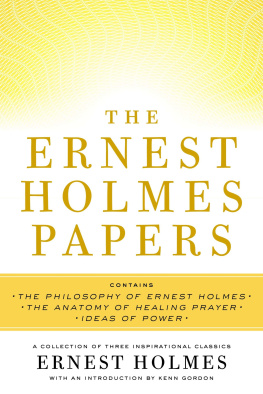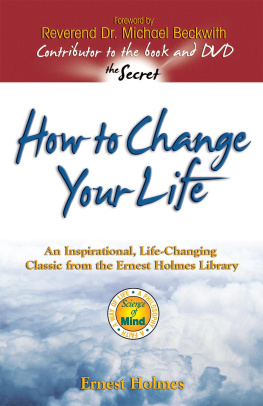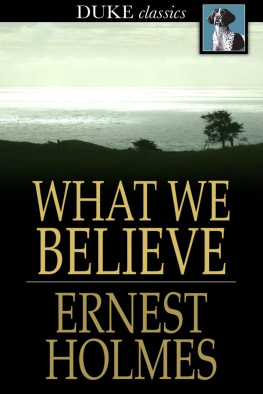George P. Bendall was a close friend and associate of Dr. Ernest Holmes. After Dr. Holmess wife Hazel passed away, Mr. Bendall lived in Dr. Holmess home. Because of this close association, Bendall was privy to the internal life of Dr. Holmes in his later years. Bendall revealed his understanding of Holmess inner life in the introductory sections of each volume of the original Holmes Papers, which are included in this anthology.
The material included in this anthology is derived from spontaneous, intimate talks delivered in private with close personal friends and associates during the last year or two of Dr. Holmess life. Material also comes from the Tuesday Invitational Group at the Institute of Religious Science in Los Angeles, as well as with Holmess private practitioners class. Also included is a transcription of Holmess dedication of the Whittier Church of Religious Science on February 12, 1959, which included Holmess cosmic consciousness experience that is of special note to Science of Mind students. All of the material is presented as close to verbatim as possible, with only minimal changes to improve clarity and comprehension.
FOREWORD
This compendium of Ernest Holmess public talks, compiled by his long time associate George Bendall and edited by Arthur Vegara, brings into the public venue not only the brilliant mind of the man Holmes, but also the character and soul of one of Americas greatest philosophers. Ernest Shurtleff Holmes was born in 1887 in Maine and died April 7th, 1960 in Los Angeles. In that seventy-three years he formulated, applied, and founded the Religious Science organizationnow known as Centers for Spiritual Livingwrote over twenty books, initiated, published, and wrote both The Science of Mind and Creative Thought magazines, and spoke most every week at one or more of the churches and centers he led around the world. His pivotal teaching, The Science of Mind, is a spiritual philosophy that is known as a leader in todays New Thought movement as a working cosmology that provides a positive and supportive approach to daily living and to connection with a higher power. It focuses on humankinds relationship with what is often referred to as Spirit, and provides both an imminent approach to life and a transcendent understanding of the individual and societys place in the Universe.
This compilation of The Ernest Holmes Papers is a revised version of three books put together by George Bendall. The Philosophy of Ernest Holmes, The Anatomy of Healing Prayer, and Ideas of Power. It is a collection of Ernest Holmess public lectures over the last years of his life and sets about, in a most human and personal manner, bringing to life not only thirty-eight of Ernest Holmess best lectures but also Ernest Holmes himself. It covers the A-to-Z of his spiritual philosophy from The History of New Thought to God and Your Personality. In between, it delivers a perspective on Ernest Holmess personal evolution, as well as insight into who he was as a human and how he applied this marvelous teaching not only in his own life but to the lives of others. Above all else, it touches your soul.
My personal feelingafter a lifetime of studying this man and his teachingis that it brings a powerful and productive touch to the study of the Science of Mind. For me, it has a way of bypassing the intellect and delving deep into my soul and the soul of Ernests work. Reading the spoken word somehow circumvents the intellect and reaches deep into my own personal resonant knowing. His charisma and life energy flow clearly, even in the written word, and awe me with an understanding of the power and might he must have commanded when he stood in front of thousands of people and eloquently described the beauty and simplicity of life in person. As the biblical phrase goes, it restoreth my soul. It brings his personality to the forefront so that one might feel the faith and passion he had for life and in life. It awakens something deep that lies in repose awaiting a stirring to magnify it and birth it back into conscious recognition. And it does more. It provides practical and applicable means, motivation, and pathways to change ones life and, in so doing, change the world. It captures the gift of Ernest and rises above the veil of opinion and personal interpretation that one might experience when being taught by another. It focuses on the teachers of Science of Mind and, in so doing, dissolves the preconceived notions of others and lands the reader solidly on their own two feet in the midst of their own and Ernests greatness. It awakens and cleanses what some consider to be the greatest distillation of the greatest teachings that exist in the world.
This is a book not only for students of the Science of Mind, but also for anyone who desires to become awake and apply spirituality in their life and the life of the world. The spiritual organization that Holmes spent his life creatingwhich is now known as Centers for Spiritual Livingholds as a purpose, the awakening of humanity to its spiritual magnificence and is drawn by its vision, which is Holmess vision, to a world that works for all.
As such, this is an awakening collection.
Whether you are a minister, a practitioner, a student, or a novice, even if you have never heard of Ernest Holmes and the Science of Mind, I guarantee you one thingafter you read this, you will be more awake to the beauty and power of life than you ever were before. Ernest Holmes was a gift to this world and this collection brings to life exactly what that gift is. He writes, I think we should feel we are on a mission. Not a mission of sadness to save soulsthey are not lost; if they were you wouldnt know where to look for thembut a mission that glorifies the soul. Not to find we are here for salvation, but for glorificationthe beauty, the wonder, the delight of that Something that sings and sings and sings in the soul of man. Ernest Holmes, like all other great avatars, saw into the future and, in so doing, he saw the potential of this life. He said, There is no question in my mind but what we are is the next greatest religion of the futurebecause the religion of the future will be a combination; it will come from science, from philosophy, and from religion. It will come, as science becomes, less and less materialistic, which it is now doing; when philosophy stops being dualistic, as though there were a material and spiritual universeor just a material; and when theology gets over its superstition.









